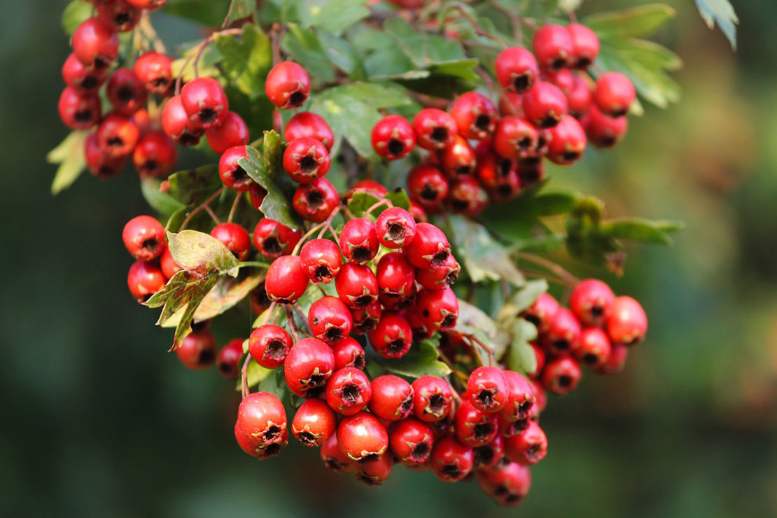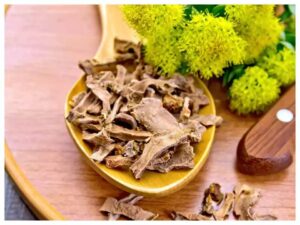The Mysterious Discovery of Hawthorn
The Ancient Greeks
The ancient Greeks are believed to have been the first to recognize the medicinal properties of Hawthorn. They used the plant to treat heart diseases, digestive issues, and high blood pressure.
The Celtic Connection
The Celts also held Hawthorn in high regard and believed it to be a sacred plant. They used the branches of the Hawthorn tree to decorate their homes during Beltane, a festival that marks the beginning of summer. The Hawthorn was also associated with fairies and was believed to be a gateway to the Otherworld.
The Chinese Tradition
In China, Hawthorn has been used for centuries to aid digestion and improve blood circulation. It is also believed to have a calming effect on the mind and has been used to treat anxiety and depression.
The Medieval Era
During the medieval era, the use of Hawthorn for medicinal purposes gained popularity. The plant was believed to have a protective effect on the heart and was used to treat heart conditions such as angina and heart failure.
The Native American Connection
Native American tribes also recognized the medicinal properties of Hawthorn. They used the plant to treat indigestion, diarrhea, and as a heart tonic. They also believed that the plant had magical properties and used it in their spiritual rituals.
Modern Science
In recent times, modern science has confirmed the health benefits of Hawthorn. Studies have shown that Hawthorn can lower blood pressure, reduce cholesterol levels, and improve heart function. It is also believed to have antioxidant properties and can help prevent cancer.
Conclusion
The discovery of Hawthorn is a fascinating mystery, with various cultures around the world recognizing the medicinal properties of the plant. Today, Hawthorn continues to be used for its health benefits and is a popular natural remedy for heart-related conditions. Its discovery and continued use over the centuries are a testament to the power of nature and the importance of traditional knowledge.

The Miraculous Health Benefits of Hawthorn
Introduction
Hawthorn, also known as Crataegus, is a plant that has been used for centuries for its medicinal properties. Hawthorn has been recognized for its ability to support heart health, reduce anxiety, and aid digestion. In recent years, modern science has confirmed the health benefits of Hawthorn, making it a popular natural remedy. In this article, we will explore the numerous health benefits of Hawthorn.
Heart Health
Hawthorn is most commonly known for its heart-protective properties. Studies have shown that Hawthorn can improve blood flow to the heart, lower blood pressure, and reduce the risk of heart disease. Hawthorn works by dilating the blood vessels, allowing for better blood flow and reducing the workload on the heart.
Hawthorn has been found to be particularly effective in treating mild to moderate heart failure. In a study published in the European Journal of Heart Failure, researchers found that patients with mild to moderate heart failure who took a Hawthorn extract had improved heart function and exercise tolerance compared to those who took a placebo.
Anxiety and Depression
Hawthorn has been found to have a calming effect on the nervous system, making it an effective natural remedy for anxiety and depression. Hawthorn has been found to increase the levels of serotonin, a neurotransmitter that is responsible for regulating mood.
In a study published in the Journal of Alternative and Complementary Medicine, researchers found that participants who took a Hawthorn extract had lower levels of anxiety and depression compared to those who took a placebo.
Digestion
Hawthorn has been used for centuries to aid digestion. It works by stimulating the production of digestive enzymes and increasing the flow of bile. Hawthorn has been found to be particularly effective in treating indigestion, bloating, and constipation.
In a study published in the European Journal of Gastroenterology and Hepatology, researchers found that participants who took a Hawthorn extract had improved digestion and reduced symptoms of indigestion compared to those who took a placebo.
Cholesterol
Hawthorn has been found to be effective in reducing cholesterol levels. Hawthorn works by inhibiting the enzyme responsible for cholesterol synthesis, thereby reducing the amount of cholesterol produced by the liver.
In a study published in the American Journal of Chinese Medicine, researchers found that participants who took a Hawthorn extract had reduced levels of total cholesterol and LDL (bad) cholesterol compared to those who took a placebo.
Antioxidant Properties
Hawthorn has antioxidant properties, which means that it can help prevent damage to cells caused by free radicals. Free radicals are unstable molecules that can cause damage to cells, leading to inflammation and chronic diseases such as cancer.
In a study published in the Journal of Agricultural and Food Chemistry, researchers found that Hawthorn had high levels of antioxidants and could be used as a natural remedy to prevent oxidative stress and reduce the risk of chronic diseases.
Blood Sugar
Hawthorn has been found to be effective in reducing blood sugar levels. Hawthorn works by inhibiting the enzyme responsible for the breakdown of carbohydrates, thereby reducing the amount of glucose produced by the liver.
In a study published in the Journal of Ethnopharmacology, researchers found that participants who took a Hawthorn extract had reduced levels of blood sugar compared to those who took a placebo.
Anti-Inflammatory Properties
Hawthorn has anti-inflammatory properties, which means that it can help reduce inflammation in the body. Inflammation is a natural response to injury or infection, but chronic inflammation can lead to chronic diseases such as arthritis and heart disease.
In a study published in the Journal of Cardiovascular Pharmacology, researchers found that Hawthorn had anti-inflammatory properties and could be used as a natural remedy to reduce inflammation and prevent chronic diseases.
Dosage and Precautions
Hawthorn is generally considered safe for most people when taken in recommended doses. The recommended dose of Hawthorn extract is 300 to 600 mg per day.
However, it is important to note that Hawthorn may interact with certain medications, including beta-blockers, calcium channel blockers, and nitrates. Hawthorn may also increase the effects of medications used to treat erectile dysfunction, such as sildenafil (Viagra) and tadalafil (Cialis).
It is important to consult with a healthcare provider before taking Hawthorn, especially if you are taking any medications or have a medical condition.
Conclusion
Hawthorn is a plant that has been used for centuries for its medicinal properties. Hawthorn has been found to be effective in supporting heart health, reducing anxiety and depression, aiding digestion, reducing cholesterol levels, and preventing chronic diseases.
While Hawthorn is generally considered safe, it is important to consult with a healthcare provider before taking Hawthorn, especially if you are taking any medications or have a medical condition.
Overall, Hawthorn is a natural and effective remedy that can be used to support overall health and wellbeing.
The Nutritional Components and Core Ingredients of Hawthorn
Nutritional Components
Hawthorn contains a variety of nutritional components, including vitamins, minerals, and antioxidants. Here are some of the key nutritional components found in Hawthorn:
Vitamin C
Hawthorn is a rich source of vitamin C, which is a powerful antioxidant that helps protect the body from free radicals. Vitamin C also supports the immune system and helps the body absorb iron.
Flavonoids
Hawthorn contains a variety of flavonoids, which are antioxidants that help protect the body from free radicals. Flavonoids have been found to have anti-inflammatory and anti-cancer properties.
Triterpenoids
Hawthorn contains triterpenoids, which are compounds that have been found to have anti-inflammatory and antioxidant properties. Triterpenoids have also been found to support heart health.
Proanthocyanidins
Hawthorn contains proanthocyanidins, which are antioxidants that help protect the body from free radicals. Proanthocyanidins have also been found to support heart health and improve blood flow.
Core Ingredients
Hawthorn contains a variety of core ingredients, including flavonoids, tannins, and oligomeric procyanidins. Here are some of the key core ingredients found in Hawthorn:
Flavonoids
Hawthorn contains a variety of flavonoids, including quercetin, hyperoside, and rutin. Flavonoids have been found to have antioxidant and anti-inflammatory properties, and can help improve blood flow.
Tannins
Hawthorn contains tannins, which are compounds that have astringent properties. Tannins have been found to help reduce inflammation and support digestive health.
Oligomeric Procyanidins
Hawthorn contains oligomeric procyanidins, which are compounds that have antioxidant properties. Oligomeric procyanidins have been found to support heart health and improve blood flow.

Methods for Consuming Hawthorn
Capsules and Tablets
Hawthorn is available in capsule and tablet form, which can be taken orally with water. Capsules and tablets are a convenient way to consume Hawthorn, as they are easy to take and can be found at health food stores and online retailers.
Capsules and tablets are typically made from a concentrated extract of the Hawthorn plant, which contains the key nutritional components and core ingredients. The recommended dose of Hawthorn extract is 300 to 600 mg per day.
One of the advantages of taking Hawthorn in capsule or tablet form is that it allows for precise dosing. Capsules and tablets are also a good option for people who do not like the taste of Hawthorn tea or tincture.
Tinctures
Hawthorn is also available in tincture form, which is a concentrated liquid extract. Tinctures are made by steeping the leaves and flowers of the Hawthorn plant in alcohol or another solvent.
Tinctures are typically taken orally by adding a few drops to water or another liquid. Tinctures are a convenient way to consume Hawthorn, as they are easy to take and can be found at health food stores and online retailers.
One of the advantages of taking Hawthorn in tincture form is that it allows for more rapid absorption into the bloodstream. Tinctures are also a good option for people who do not like the taste of Hawthorn tea.
Teas
Hawthorn is available in tea form, which is made by steeping the leaves and flowers of the Hawthorn plant in hot water. Hawthorn tea is a natural and refreshing way to consume Hawthorn, and can be found at health food stores and online retailers.
To make Hawthorn tea, add one teaspoon of dried Hawthorn leaves and flowers to a cup of boiling water. Steep for 10 to 15 minutes, then strain and drink. Hawthorn tea can be consumed hot or cold.
One of the advantages of drinking Hawthorn tea is that it allows for a more gradual absorption of the nutritional components and core ingredients. Hawthorn tea is also a good option for people who prefer natural remedies and enjoy drinking tea.
Syrups
Hawthorn is also available in syrup form, which is a concentrated extract that is mixed with a sweetener. Hawthorn syrup is typically taken orally by adding a few drops to water or another liquid.
Hawthorn syrup is a convenient way to consume Hawthorn, as it is easy to take and can be found at health food stores and online retailers. However, it is important to check the ingredients of the Hawthorn syrup, as some brands may contain added sugars or other additives.
Precautions
While Hawthorn is generally considered safe, it is important to consult with a healthcare provider before taking Hawthorn, especially if you are taking any medications or have a medical condition.
In addition, Hawthorn may cause side effects in some people, including dizziness, nausea, and gastrointestinal upset. It is important to start with a low dose of Hawthorn and gradually increase the dose over time.
Conclusion
Hawthorn is a plant that has been used for centuries for its medicinal properties. Hawthorn contains a variety of nutritional components and core ingredients that contribute to its health benefits. Hawthorn can be consumed in a variety of forms, including capsules, tablets, tinctures, teas, and syrups Each method for consuming Hawthorn has its own advantages and disadvantages, and it is important to choose the method that is best suited to your individual needs and preferences.
Capsules and tablets are a convenient way to consume Hawthorn, as they allow for precise dosing and are easy to take. Tinctures are a good option for people who prefer more rapid absorption into the bloodstream, and Hawthorn tea is a natural and refreshing way to consume Hawthorn that allows for a more gradual absorption of the nutritional components and core ingredients.
It is important to check the ingredients of any Hawthorn products you purchase, as some brands may contain added sugars or other additives. In addition, it is important to consult with a healthcare provider before taking Hawthorn, especially if you are taking any medications or have a medical condition.
Overall, Hawthorn is a natural and effective remedy that can be used to support overall health and wellbeing. Whether you choose to consume Hawthorn in capsule, tablet, tincture, tea, or syrup form, incorporating Hawthorn into your daily routine can help improve your health and wellbeing.

Potential Side Effects and When to Avoid Taking Hawthorn
Potential Side Effects
Hawthorn is generally considered safe for most people when taken in recommended doses. However, some people may experience side effects when taking Hawthorn, including:
Gastrointestinal Upset
Hawthorn may cause gastrointestinal upset in some people, including nausea, vomiting, and diarrhea. This is more likely to occur when taking high doses of Hawthorn.
Dizziness
Hawthorn may cause dizziness in some people, particularly when taken in high doses. This may be due to the vasodilatory effects of Hawthorn, which can cause a temporary drop in blood pressure.
Headache
Some people may experience headache when taking Hawthorn, particularly when taking high doses. This may be due to the vasodilatory effects of Hawthorn, which can cause blood vessels to dilate and increase blood flow to the brain.
Allergic Reactions
Some people may experience allergic reactions when taking Hawthorn, particularly if they are allergic to plants in the rose family. Symptoms of an allergic reaction may include itching, hives, and difficulty breathing.
When to Avoid Taking Hawthorn
While Hawthorn is generally considered safe, there are certain situations in which it may not be appropriate to take Hawthorn. Here are some situations in which you should avoid taking Hawthorn:
Pregnancy and Breastfeeding
There is limited research on the safety of Hawthorn during pregnancy and breastfeeding. As a result, it is generally recommended that pregnant and breastfeeding women avoid taking Hawthorn.
Children
There is limited research on the safety of Hawthorn in children. As a result, it is generally recommended that children under the age of 18 avoid taking Hawthorn.
Medications
Hawthorn may interact with certain medications, including beta-blockers, calcium channel blockers, and nitrates. Hawthorn may also increase the effects of medications used to treat erectile dysfunction, such as sildenafil (Viagra) and tadalafil (Cialis).
If you are taking any medications, it is important to consult with a healthcare provider before taking Hawthorn.
Medical Conditions
Hawthorn may not be appropriate for people with certain medical conditions, including low blood pressure, heart conditions, and liver or kidney disease. If you have a medical condition, it is important to consult with a healthcare provider before taking Hawthorn.
Useful Links
The Woodland Trust https://www.woodlandtrust.org.uk/trees-woods-and-wildlife/british-trees/a-z-of-british-trees/hawthorn/
WebMD https://www.webmd.com/vitamins/ai/ingredientmono-527/hawthorn
Encyclopedia Britannica https://www.britannica.com/plant/hawthorn






